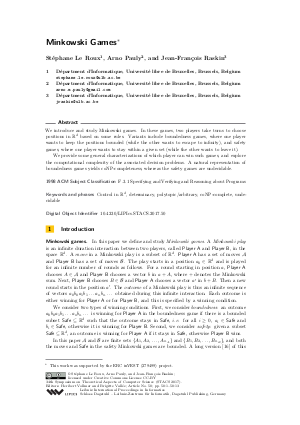Minkowski Games
Authors Stéphane Le Roux, Arno Pauly, Jean-François Raskin
-
Part of:
Volume:
34th Symposium on Theoretical Aspects of Computer Science (STACS 2017)
Part of: Series: Leibniz International Proceedings in Informatics (LIPIcs)
Part of: Conference: Symposium on Theoretical Aspects of Computer Science (STACS) - License:
 Creative Commons Attribution 3.0 Unported license
Creative Commons Attribution 3.0 Unported license
- Publication Date: 2017-03-06
File

PDF
LIPIcs.STACS.2017.50.pdf
- Filesize: 0.56 MB
- 13 pages
Document Identifiers
Subject Classification
Keywords
- Control in R^d
- determinacy
- polytopic/arbitrary
- coNP-complete
- undecidable
Metrics
- Access Statistics
-
Total Accesses (updated on a weekly basis)
0Document
0Metadata
Abstract
We introduce and study Minkowski games. In these games, two players take turns to choose positions in R^d based on some rules. Variants include boundedness games, where one player wants to keep the positions bounded (while the other wants to escape to infinity), and safety games, where one player wants to stay within a given set (while the other wants to leave it). We provide some general characterizations of which player can win such games, and explore the computational complexity of the associated decision problems. A natural representation of boundedness games yields coNP-completeness, whereas the safety games are undecidable.
Cite As Get BibTex
Stéphane Le Roux, Arno Pauly, and Jean-François Raskin. Minkowski Games. In 34th Symposium on Theoretical Aspects of Computer Science (STACS 2017). Leibniz International Proceedings in Informatics (LIPIcs), Volume 66, pp. 50:1-50:13, Schloss Dagstuhl – Leibniz-Zentrum für Informatik (2017)
https://doi.org/10.4230/LIPIcs.STACS.2017.50
BibTex
@InProceedings{leroux_et_al:LIPIcs.STACS.2017.50,
author = {Le Roux, St\'{e}phane and Pauly, Arno and Raskin, Jean-Fran\c{c}ois},
title = {{Minkowski Games}},
booktitle = {34th Symposium on Theoretical Aspects of Computer Science (STACS 2017)},
pages = {50:1--50:13},
series = {Leibniz International Proceedings in Informatics (LIPIcs)},
ISBN = {978-3-95977-028-6},
ISSN = {1868-8969},
year = {2017},
volume = {66},
editor = {Vollmer, Heribert and Vall\'{e}e, Brigitte},
publisher = {Schloss Dagstuhl -- Leibniz-Zentrum f{\"u}r Informatik},
address = {Dagstuhl, Germany},
URL = {https://drops.dagstuhl.de/entities/document/10.4230/LIPIcs.STACS.2017.50},
URN = {urn:nbn:de:0030-drops-69849},
doi = {10.4230/LIPIcs.STACS.2017.50},
annote = {Keywords: Control in R^d, determinacy, polytopic/arbitrary, coNP-complete, undecidable}
}
Author Details
References
-
Rajeev Alur, Vojtech Forejt, Salar Moarref, and Ashutosh Trivedi. Safe schedulability of bounded-rate multi-mode systems. In Proceedings of the 16th international conference on Hybrid systems: computation and control, HSCC 2013, April 8-11, 2013, Philadelphia, PA, USA, pages 243-252. ACM, 2013.

-
Rajeev Alur, Ashutosh Trivedi, and Dominik Wojtczak. Optimal scheduling for constant-rate multi-mode systems. In Hybrid Systems: Computation and Control (part of CPS Week 2012), HSCC'12, Beijing, China, April 17-19, 2012, pages 75-84. ACM, 2012.

- Michael Ben-Or, Dexter Kozen, and John Reif. The complexity of elementary algebra and geometry. Journal of Computer and Systems Sciences, 32(2):251-264, 1986. URL: http://dx.doi.org/10.1016/0022-0000(86)90029-2.
- Bernard Chazelle. An optimal convex hull algorithm in any fixed dimension. Discrete & Computational Geometry, 10:377-409, 1993. URL: http://dx.doi.org/10.1007/BF02573985.
- James H. Davenport and Joos Heintz. Real quantifier elimination is doubly exponential. Journal of Symbolic Computation, 5(1):29-35, 1988. URL: http://dx.doi.org/10.1016/S0747-7171(88)80004-X.
- Rod Downey and Michael Fellows. Parameterized Complexity. Springer, 1999. URL: http://dx.doi.org/10.1007/978-1-4612-0515-9.
- Laurent Doyen and Alexander Rabinovich. Robot games. Research Report LSV-13-02, Laboratoire Spécification et Vérification, ENS Cachan, France, 2013. URL: http://www.lsv.ens-cachan.fr/Publis/RAPPORTS_LSV/PDF/rr-lsv-2013-02.pdf.
-
Thomas A. Henzinger, Benjamin Horowitz, and Rupak Majumdar. Rectangular hybrid games. In CONCUR'99: Concurrency Theory, 10th International Conference, Eindhoven, The Netherlands, August 24-27, 1999, Proceedings, volume 1664 of Lecture Notes in Computer Science, pages 320-335. Springer, 1999.

-
Thomas A. Henzinger and Peter W. Kopke. Discrete-time control for rectangular hybrid automata. In Automata, Languages and Programming, 24th International Colloquium, ICALP'97, Bologna, Italy, 7-11 July 1997, Proceedings, volume 1256 of Lecture Notes in Computer Science, pages 582-593. Springer, 1997.

- Stéphane Le Roux and Arno Pauly. Finite choice, convex choice and finding roots. Logical Methods in Computer Science, 2015. URL: http://dx.doi.org/10.2168/LMCS-11(4:6)2015.
-
Oded Maler, Amir Pnueli, and Joseph Sifakis. On the synthesis of discrete controllers for timed systems (an extended abstract). In STACS, pages 229-242, 1995.

-
Marvin L. Minsky. Recursive unsolvability of Post’s problem of "tag" and other topics in theory of Turing machines. Annals of Mathematics, 74(3):437-455, 1961.

- Reino Niskanen, Igor Potapov, and Julien Reichert. Undecidability of Two-dimensional Robot Games. In Piotr Faliszewski, Anca Muscholl, and Rolf Niedermeier, editors, 41st Int. Sym. on Mathematical Foundations of Computer Science (MFCS 2016), volume 58 of LIPIcs, pages 73:1-73:13. Schloss Dagstuhl, 2016. URL: http://dx.doi.org/10.4230/LIPIcs.MFCS.2016.73.
- Arno Pauly. On the topological aspects of the theory of represented spaces. Computability, 5(2):159-180, 2016. URL: http://dx.doi.org/10.3233/COM-150049.
-
Amir Pnueli and Roni Rosner. On the synthesis of a reactive module. In Conference Record of the Sixteenth Annual ACM Symposium on Principles of Programming Languages, Austin, Texas, USA, January 11-13, 1989, pages 179-190. ACM Press, 1989.

- Stéphane Le Roux, Arno Pauly, and Jean-François Raskin. Minkowski games. CoRR, abs/1609.07048, 2016. URL: http://arxiv.org/abs/1609.07048.
-
Klaus Weihrauch. Computable Analysis. Springer-Verlag, 2000.

-
Martin Ziegler. Computable operators on regular sets. Mathematical Logic Quarterly, 50:392-404, 2004.

